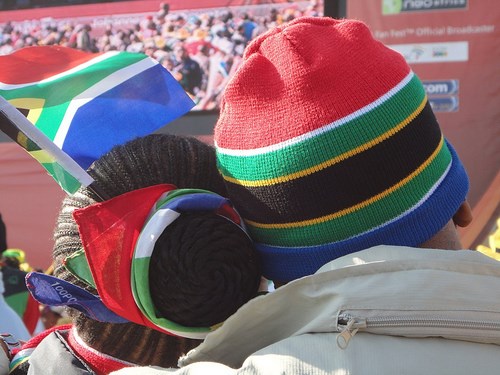‘Long-term’ is key for South African World Cup investment

All expectations for the South African benefits of the World Cup were not quite fulfilled, but the brand of South Africa came out strengthened. Photo by flickr user AfricanGoals2010. Used under a Creative Commons 2.0 License
02.11.2010
By Miko Schneider700 million people were watching on TV and millions more were reading online or talking about it via social media. With this in mind, national and local governments (through their taxpayers) forked out billions of Rands on much-needed infrastructure spending, as well as the construction of mega stadia that now threaten to become ‘white elephants’.
Great expectations
The nation’s citizens envisaged a giant boost to its recently lagging tourism industry. They also envisaged employment opportunities, a bonus winter season for the informal trading sector, and an injection of long-term foreign investment.
As it turns out, FIFA pocketed all revenues from broadcasting rights; and ticket sales - the South African government’s main revenue stream - took a knock when, weeks before the event, tickets remained unsold, prompting state subsidization and free giveaways. The 22,000 unskilled jobs created only lasted approximately 3 months and the informal vendors expecting walking trade outside stadia were vastly restricted, as were any non-approved products they may have intended to sell.
Tourist numbers were far lower than initially expected. Statistics South Africa’s Tourism and Migration report listed a 19,4% increase in tourist arrivals in June and July 2010, compared to the same period in 2009. Government forecast consultants had predicted approximately 100,000 more visitors in that period than had actually arrived (and that estimate was already lower than earlier forecasts).
Accommodation occupancy was remarkably disappointing - the Financial Times Weekend reports how FIFA’s accommodation agency reserved 92,000 nights at a South African university and returned 91,000 unused – and tourists were mostly concentrated in the major city centres, while those cities and towns slightly off the beaten track received comparatively little tourist spend.
Long-term investment in the SA brand
However, industry stakeholders claim it is not necessarily traffic during the tournament but the long-term investment in the South African brand that is key.
When asked whether he believed South Africa’s brand expectations were met by the World Cup, Marc Hershowitz, formerly of the University of Cape Town Unilever Institute of Strategic Marketing, says, “FIFA commissioned a six wave study of South African residents post World Cup and the findings were glowing. The study showed a marked upswing in national confidence - both local and abroad... of the 75% of all visitors who toured South Africa for the first time, 83% stated their intention to return and a staggering 94% expressed they would gladly recommend South Africa to friends and family.”
Foreign investment
And what of the other intangible return on South Africa’s spending - putting the country on the ‘world map’ for investment by transnational corporations? Well, this was always contingent and by no means guaranteed.
Finance Minister Pravin Gordhan is optimistic - despite public workers strikes, the strong Rand, dampened spending in Europe and the US, and issues regarding corporate property rights in recent months – that the World Cup left South Africa on a stronger footing for foreign direct investment.
Miller Motola, CEO of the International Marketing Council that manages Brand South Africa mentioned that Standard & Poor are due to review South Africa’s credit rating, but this has yet to materialise.
Whether the World Cup showed global business that South Africa can tackle crime and rally resources to achieve its goals; or whether it was merely a cover up of socio-economic weaknesses that will persist long after June-July 2010, will be a key factor when transnational corporations weigh-up South Africa’s stability for their investment.
Download the full report from Statistics South Africa here





